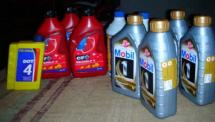
Synthetic oil vs Mineral oil
Synthetic engine oil offers far superior lubrication as compared to conventional mineral-based oil. Mineral engine oil is almost entirely natural while synthetic oil is the product of chemical preparation with carefully perfected formulae. Most brands of synthetic oil include performance-enhancing additives like polyalphaolefin (PAO), synthetic esters and alkylated aromatics. The molecules of synthetic oil are also more consistent in size and shape than those of natural oil. The master of automotive engineering - Porsche - was the first car manufacturer to factory-fill its engines with synthetic oil before delivery.
Team-BHP recommends synthetic oil as your engine lubricant. Synthetic oils are known to offer outstanding protection under all operating conditions. Synthetic oil maintains consistent viscosity even in very high heat and, since most engine wear occurs at start-up, works to offer more lubrication at this crucial stage. The bottom line is that synthetic oil use leads to longer life, more efficiency and enhanced performance for your engine. Some tests have also indicated a marginal increase in power. My Honda City Vtec has covered 75,000 kms on Mobil 1, and the engine still feels like new. Despite frequent doses of enjoyable high-revving to the red line.
Here is the Team-BHP guide to using synthetic engine oil:
No synthetics during the running-in period: Wear and tear is actually good for a new engine. Synthetic oil, with its superior lubricating properties, hinders the running-in process and is best used only after 10,000 – 15,000 km.
The right grade: It is vital that you choose your engine oil based on the grade your manufacturer recommends. If your owner’s manual suggests a 10W–40 grade oil, make certain that you use that only.
Engine flush before change: We suggest using an engine flush before switching from conventional to synthetic oil. Please be advised that some older / high-mileage engines do not take well to engine flushing, so it is best to check with a competent mechanic before proceeding.
Extended oil change intervals?: Even though most synthetic oil brands boast of extended oil change intervals, Team-BHP recommends that you still change your engine oil every 7,500 – 10,000 km. Indian driving conditions put a lot of stress on your engine with low average speeds, bumper-to-bumper traffic and harsh environmental conditions.
The right filter: It is surprising how many counterfeit auto parts are on the market. Use only high-quality OEM oil filters, preferably bought from authorized service stations. You must change your oil filter with every oil change.
Diesel engines: Diesel engines benefit as much from synthetic oil as petrol engines. However, and especially for diesel engines, it is very important for you to match the synthetic oil grade with the one recommended by your manufacturer. Some synthetic lubes may have very high petrol engine standards, but not necessarily so for the diesels.
Semi-synthetic oil: This oil is a blend of synthetic and mineral oil and is targeted at the value-conscious market. Though it offers some of the benefits of fully synthetic oil at a lower price, fully-synthetics offer far superior performance and protection.
Cost: The only real disadvantage to synthetic oil is that it is more expensive than mineral oil. We feel that the protective advantage of synthetic oil makes it well worth the price.
Additional recommended read:












